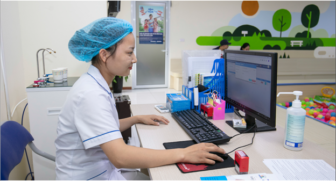
User-centered evaluation of the Vietnam National Immunization Information System: Challenges and benefits
Jul 30, 2021
Posted in Monitoring & Evaluation, Products
Electronic immunization registries (EIRs) are defined as “confidential, computerized, population-based systems that collect and consolidate vaccination data from vaccination providers for better immunization strategies.” And evidence suggests that EIRs can help increase vaccination coverage.
Read More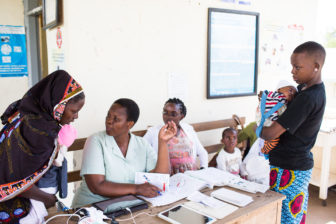
Tanzania achieves digital transformation as it transitions two new regions to fully paperless immunization system
Jun 21, 2021
Posted in BID Learning Network (BLN), Policies & Practices
Digital tools are only as powerful as the individuals using them, and only meaningful if they can translate to time savings and better health data. In Tanzania, where the country’s electronic immunization registry has been in use since 2017, the country has hit a critical milestone by starting the transition to a fully paperless immunization process. Now that more than half the country has adopted the Tanzania Immunization Registry (TImR), with a commitment to scale nationally, the government has begun retiring the paper-based tools that were once used side-by-side with TImR. In the past few months it’s expanded the number of health facilities now fully transitioned to a paperless process.
Read More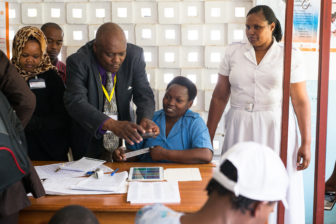
BID Learning Network engages collaborative about country priorities
Jun 3, 2021
Posted in BID Learning Network (BLN), People, Policies & Practices
After a difficult year of setbacks and delays from the COVID-19 pandemic, including disruptions to countries’ health services, increased morbidity and mortality, and economic and social setbacks, the BID Learning Network (BLN) recently convened member countries to discuss priorities for the year ahead.
Read More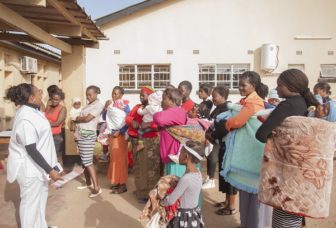
New white paper spotlights the role of digital tools and adaptive management for navigating complex health challenges
Feb 22, 2021
Posted in BID Learning Network (BLN), Monitoring & Evaluation, Packaging, Policies & Practices, Practices
As the world grappled with the global COVID-19 pandemic, many health professionals and health systems turned to adaptive management to respond to a rapidly evolving situation and its complex challenges. Faced with a strained workforce, supply shortages, and economic losses, adaptive management is an approach that embodies intentional testing and learning to navigate change and uncertainty. It has emerged from the interdisciplinary need and understanding that complex development issues and multi-stakeholder environments require agile solutions.
Read More
Public-private partnerships in immunization data strengthening: Lessons from deploying Vietnam’s electronic immunization registry
Jan 29, 2021
Posted in Uncategorized
Public-private partnerships in health care have been used widely in higher income countries as well as in lower-middle-income countries, such as Vietnam. The partnerships bundle together multiple phases or functions of the health system infrastructure—such as design, build, finance, maintain, operate, and service delivery. This health system infrastructure can effectively build on the experience and resourcing strategies of partnerships.
Read More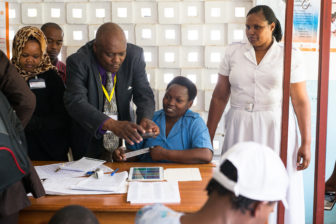
BID Learning Network serves as conduit for exchange and growth among member countries
Dec 8, 2020
Posted in Uncategorized
For the past six years, the BID Learning Network (BLN) has been a conduit of learning, information exchange, and peer support in Sub-Saharan Africa aimed at improving the availability of routine health data collection and use. In 2018, the BLN partnered with Gavi, the Vaccine Alliance, to work with countries receiving support from Gavi to improve data quality and use through peer learning and interaction, coupled with collective analysis and resolution of immunization data challenges. The work was focused on equipping countries with the capacity, plans, and solutions to improve immunization data and service delivery in alignment with Gavi programmatic areas. A critical part of this work included monitoring and documenting the experiences and lessons that emerged from the Collaborative.
Read More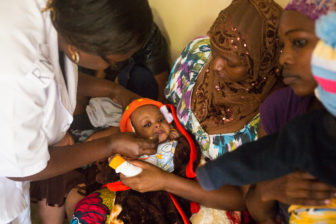
Hearing from the health workers themselves: User feedback on digital solutions accelerates progress
Nov 5, 2020
Posted in People, Policies & Practices
Sharing health workers’ experiences with digital solutions is a critical step to ensure the new tools and systems are adopted and embraced. It matters to users, implementing partners, decision makers, developers, and all who are engaged with digital health solutions. Throughout implementation of the BID Initiative in Tanzania and Zambia, feedback was collected from health workers about the devices and systems they used. This helped to inform the design of the digital tools and—once they were rolled out—contributed to their refinement and improvement.
Read More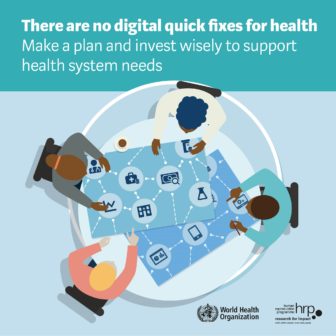
Investment in digital health needs careful planning: new WHO guide explains how to do it well
Oct 15, 2020
With the right approach and effective investment, digital health interventions can be successful long-term solutions that help to improve the health and well-being of the people they were designed to reach. A new guide has been launched by WHO to help ensure that digital health investments are effective, sustainable, and equitable – and that they are implemented in a coordinated way and appropriate for the local context. The Digital Implementation Investment Guide has been published by WHO and HRP in collaboration with PATH, UNICEF, and UNFPA.
Read More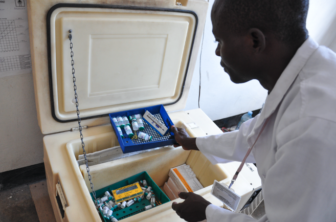
Simplifying the vaccine cost equation
Oct 7, 2020
Posted in People, Policies & Practices, Products
For country decision-makers, the opportunity to introduce a new vaccine comes with many considerations. Is the vaccine needed? What are the benefits? Is there enough capacity in the cold chain system? Often most important—what will it cost, and can our country afford it?
Read More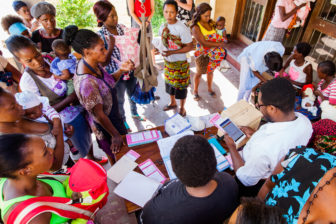
In historic milestone, Zambia expands its electronic immunization registry to a second province
Oct 6, 2020
Posted in News, Policies & Practices, Products
Zambia’s Electronic Immunization Registry (ZEIR) will roll out to a second province next month, under the leadership and direction of the Ministry of Health (MOH). It represents the government’s commitment to scaling ZEIR. It’s also a chance for the government to increasingly lead rollout. While the BID Initiative partnered with the MOH in Southern Province, Western Province will be led by the MOH, in partnership with the EPI-OPT consortium, including CHAZ, UNICEF, PATH and CIDRZ.
Read More